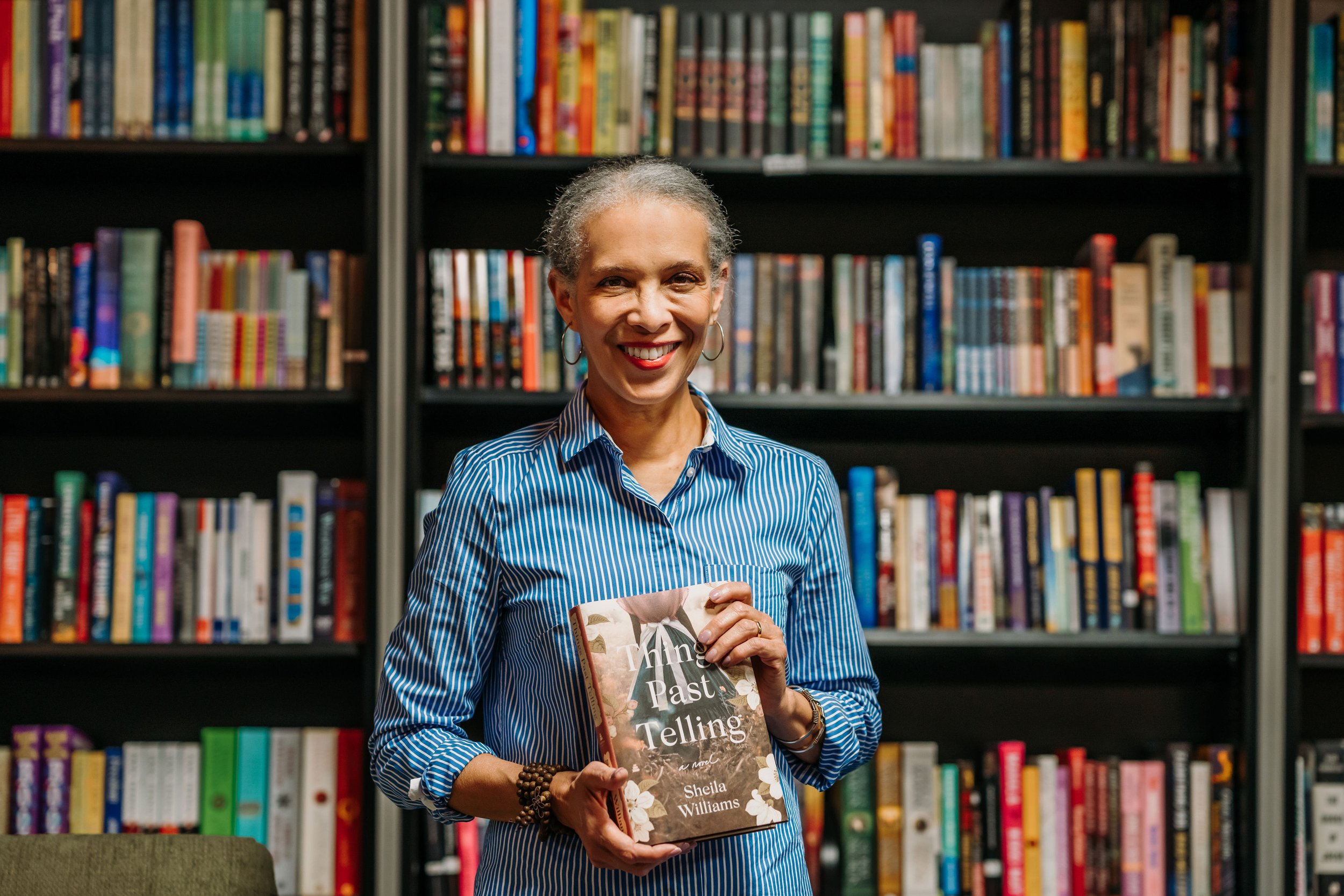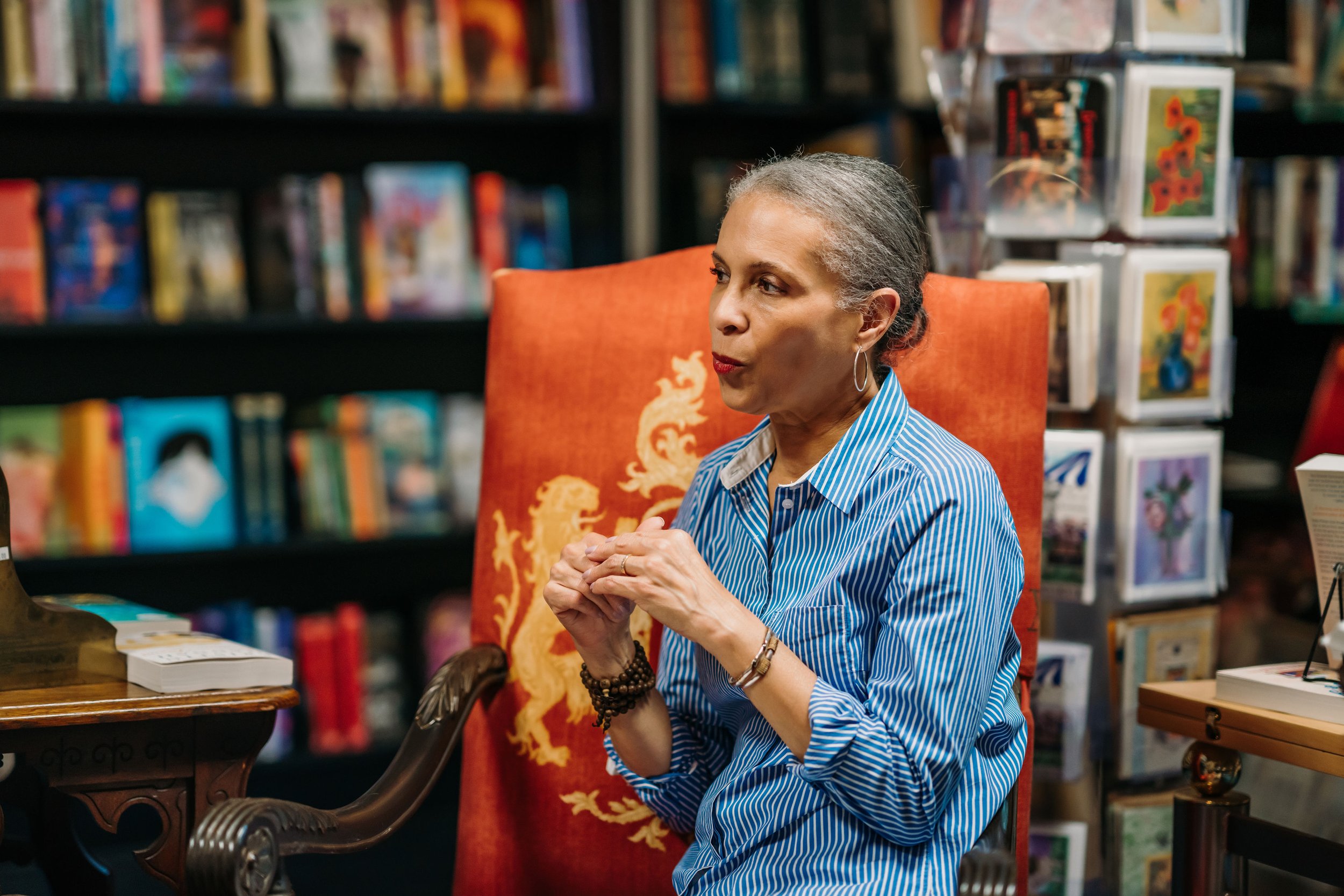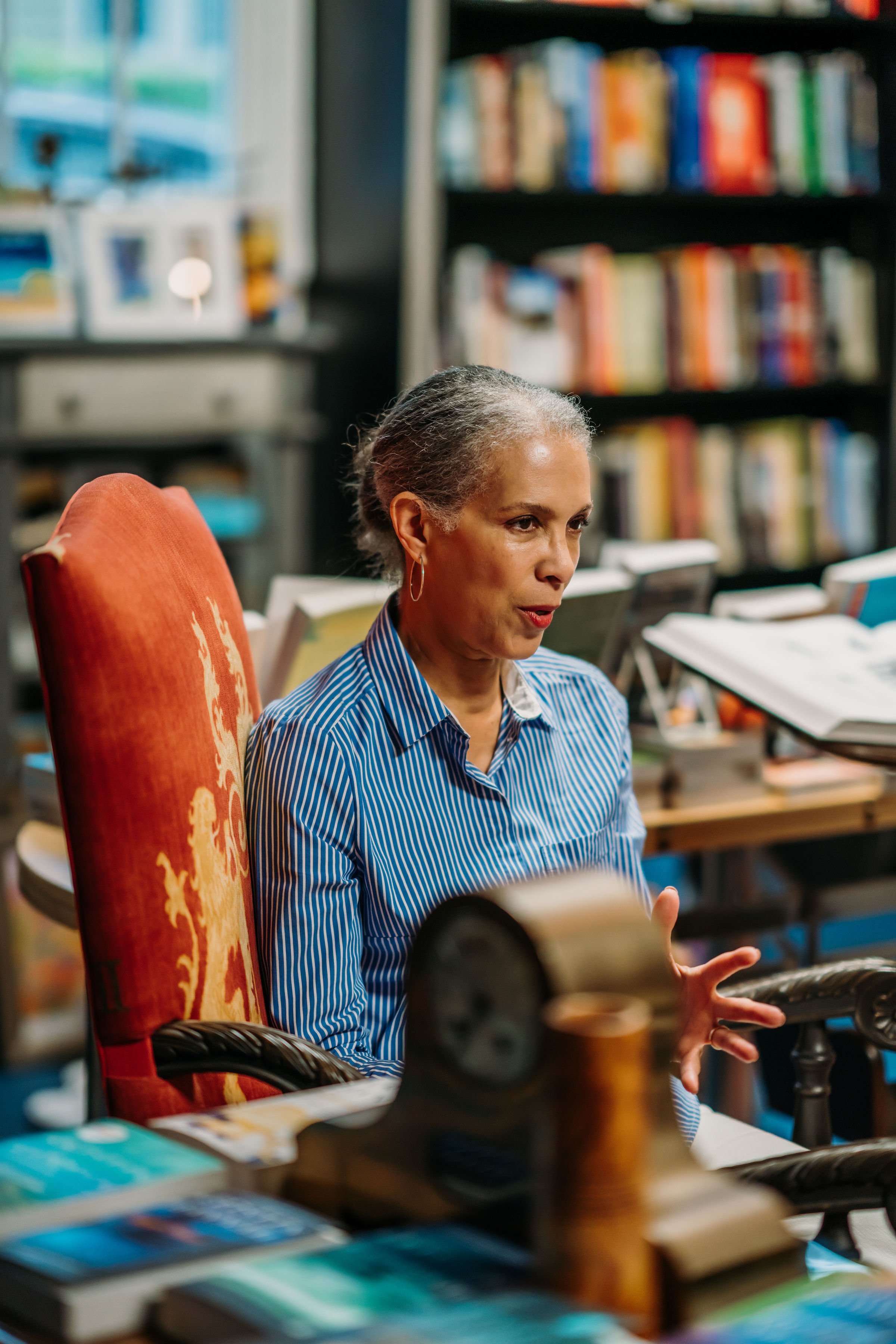Novelist Sheila Williams on Telling Black Women's Stories and Creating an Opera for Cincinnati
Interview and written by Rita DiBello. Photography by Heather Colley.
There may be no better place to spend a rainy Monday evening than amid the shelves of a cozy bookstore. Add coffee, laughter, and great conversation — and it’s instant magic.
This was the setting in early June when I sat down with Sheila Williams at Roebling Point Books & Coffee. Williams is the author of six novels, including Dancing on the Edge of the Roof, adapted into a Netflix film starring Alfre Woodard in 2018, The Secret Women, and the recently released Things Past Telling. Today, Williams calls northern Kentucky home, but she proudly notes that she is “a product of Columbus Public Schools.”
Williams describes herself as a storyteller first and foremost. She’s been that way since childhood, an avid reader who was making up stories to go with pictures from the minute she could pick up a crayon. She also comes from a long line of storytellers and grew up listening to stories, fictional and true, from her parents, grandparents, and even great-grandparents. She had her first creative writing class in high school, which she loved. She then went on to study literature in college, where she became frustrated by the lack of diversity in what she was reading for her classes. This was when she realized that she might be able to write the kinds of books she didn’t see in school.
Fast forward, and Williams’ novels often center on the stories of Black women’s lives. Like Dancing on the Edge of the Roof, about a middle-aged woman who decides to uproot her life in search of adventure, or The Secret Women, which explores relationships between mothers and daughters and the discoveries that come when we realize our mothers are their own people outside of their relationship to us. Her latest, Things Past Telling, is a historical epic following one woman’s life across 112 years from Nigeria to the Caribbean to the United States. Her novels are character-driven, making them feel relatable to readers. Williams has heard this directly from her readers over the years and tells me it’s part of how she knows the impact of storytelling. As she says, “We use storytelling and pull nourishment out when we need it, as a warning, as a signpost, as encouragement, as pleasure and enjoyment also. And as reinforcement for the spirit. Resilience, survival. All of those things.”
A one-time paralegal and now successful novelist, in recent years, Williams has added a new title to her resume: librettist. For those of us who aren’t opera aficionados, a libretto is the words of an opera or musical. Williams wrote the libretto, accompanying the music of composer William Menefield, for Cincinnati Opera’s world premiere production, Fierce, about four teenage girls sharing their stories as they write their college admission essays. Fierce will be on stage at SCPA’s Corbett Theater July 6, 9, and 10. Williams admits that when she was first approached about the possibility in 2017, she was uncertain. But ultimately, she concluded, “Puccini, Verdi, and Rossini all had a first opera, so I figured if they could have a first opera, then I could have one too.”
For Williams, Fierce began with listening. Through WordPlay Cincy and The Music Resource Center, she met with 10 young women over multiple sessions, eating pizza, drinking soda, painting nails, sharing playlists, bonding over Dr. Who — letting their comfort level and conversations grow as she focused on listening and letting them drive the dialogue. As she tells it, through these sessions:
“I began to think about characters and story and what lives for women are like. Because many of the issues that they face, I had faced. So they allowed me to time travel back to when I was 13 and 14 and 15 and 16, and it was very dramatic and sometimes disturbing to realize that some of the same things that got on my nerves, that troubled me, that frightened me, that delighted me, also troubled, frightened, delighted them.”
One big difference she recognized and wanted to acknowledge in the libretto? Cell phones and their role now in the relationships of young people: informing, misinforming, sharing, bullying, harassing, etc. This is one of the main things that makes their experience today different from her own and that of other generations. On the other hand, the power of red lipstick — inspiration for the aria “Red Lipstick Warrior” is timeless.
So Williams developed the story and set out to put it into words. But of course, in an opera, a libretto does not stand alone. An opera is collaboration at every stage. In Williams’ words, “It is a story set to music and to voice, to song . . . I had to write a story that, number one, would inspire the composer,” in this case, William Menefield. Fortunately, Menefield was inspired by what she sent, and they worked well together as he composed and she revised back and forth over many months. In the process, Williams learned to consider voice and how two or three or more words would flow together in a performance — very different from writing a book in which she, as an author, is the sole decider of what a character says and how they say it. She says this was a good experience for her, good training as a writer.
All of this was takes place between 2017 and the early months of 2020. Fierce was intended for the 2020 summer festival, celebrating Cincinnati Opera’s 100th anniversary and 100 years since the passage of the 19th Amendment. Of course, we all know what happened next. When the COVID-19 pandemic hit, Cincinnati Opera and this show, like so much else, were put on hold with no clear path forward. Jump to a reschedule for 2021, and then another postponement. Finally, it is coming to the stage a full two years later: Fierce.
The name Fierce started as a working title, one that Williams was sure she would ultimately change. But she never did, and no one at the Opera did either. And ultimately that word and that title led to the show’s final song, which both Williams and Menefield knew needed to resonate with audience members as a powerful finale. This was the last song they wrote, and, always a reader and writer at heart, Williams went back to basics for inspiration, to her early project notes, and to the Dictionary. What does it mean to be fierce? “To be tenacious and strong and focused.” For Sheila, the young women who inspired Fierce were that and are that, and “they are the heart and soul of Fierce.”
Today, Sheila has already begun research on her next project, even as she juggles the promotion of both Fierce and Things Past Telling, published in early 2022 and in many ways serving as a tribute to the women in her own family. It is this “pantheon of grandmothers” that she names as the women who have most influenced her life:
“Their resilience and determination against incredible odds. Their love of reading and stressing to this child the importance of education. Through them, I learned to walk, talk, put makeup on properly, play the piano, geek out over history, globe-trot. And all of those activities have served to support the career that I have now.”






